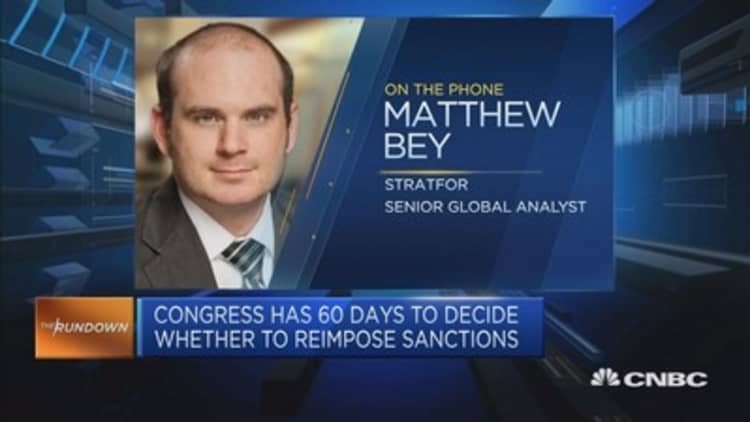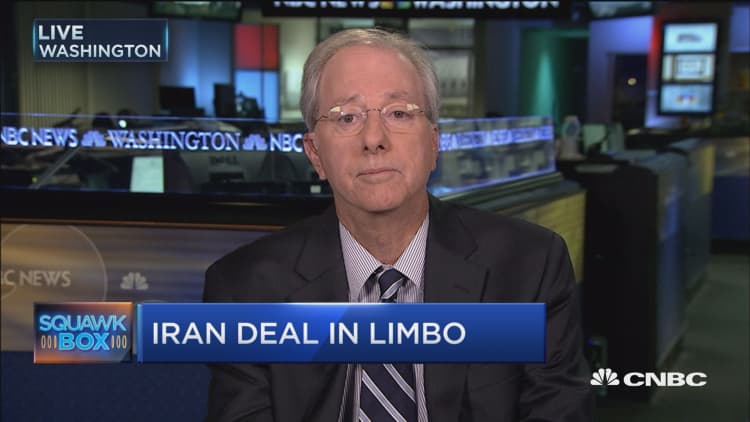The historic 2015 Iran nuclear deal is "on life support" and hanging on "by a thread" after the Trump administration plotted a new course for containing Tehran, analysts warn.
President Donald Trump on Friday refused to certify the accord to Congress. He instead asked lawmakers to toughen the agreement, negotiated between Iran and six world powers, by amending a U.S. law. At the same time, the administration will try to convince European leaders to impose new sanctions on Tehran and return to the negotiating table.
Risk consultancy Eurasia Group reduced the odds of the deal surviving from 60 percent to 55 percent on Friday after Trump said he will terminate the deal if he cannot find a solution with Congress and U.S. allies.
You can't legislate what a foreign country is going to do. We still at some point have to talk to the Iranians.Richard Nephewformer lead sanctions expert for U.S. negotiations with Iran
The strategy comes with many risks. Congress could disappoint Trump, causing him to pull out of the deal. The administration could fail to convince or coerce U.S. partners, leaving American influence diminished. Renewing sanctions could spark a trade dispute with Europe, fail to substantially dent Iranian oil exports and leave Tehran's nuclear program unfettered by restrictions or inspections currently in place.
Congress must thread a needle
In Congress, Republican Sens. Bob Corker and Tom Cotton are leading an effort to change the Iran Nuclear Agreement Review Act to automatically restore sanctions on Iran if it crosses a number of red lines that their amendment would establish. Restoring sanctions suspended under the Iran nuclear deal is seen as the most direct path to unraveling the accord.
RBC Capital Markets notes that Iran has already "vigorously rejected" renegotiating the deal, especially the clause that lifts limits on its nuclear program in 10-15 years — one of Trump's core complaints about the accord.
"Hence, such a red line, alongside demands for enhanced inspections and curbs on missile activity, could turn the [Iran Review Act] into a 'poison bill' that the Iranians would be unlikely to swallow. Such an Iranian rejection in turn could be the catalyst for Congress to reinstate the waived nuclear sanctions," said lead author Helima Croft, global head of commodity strategy at RBC.

The legislative solution is "hardly a layup," because it requires 60 votes to end debate and take a vote, according to Eurasia Group. That means Trump needs to hold all 52 Republican votes and attract eight Democrats.
"It's unclear if Trump can cross that threshold while hewing to his draconian proposals. The legislation could well morph into a softer version, leaving some room for consensus with the Europeans and Iran," Eurasia Group said.
Congress will find it difficult to establish red lines that are not so brazen that Iran will not trip them on Day One, but are not so weak that they have no influence Tehran's behavior, said Richard Nephew, lead sanctions expert for the U.S. team that negotiated the deal. If Congress draws a red line at Iran testing a ballistic missile capable of traveling a certain distance, its leaders could test one the next day and force U.S. lawmakers' hand, said Nephew, now a senior research scholar at Columbia University's Center on Global Energy Policy.
By establishing new red lines, the United States is telling Iran it cannot expand its nuclear program in a way that the 2015 international deal would have allowed, he said.
"You can't legislate what a foreign country is going to do. We still at some point have to talk to the Iranians," he said.

The key to the red lines is determining the U.S. objective and calibrating them to achieve that objective, according to Behnam Ben Taleblu, senior Iran analyst at the Foundation for Defense of Democracies, a think tank that backs a tougher line on Tehran.
If the goal is to deny Iran the capability to develop a certain type of ballistic missile, then the red lines must be strong enough to dissuade Iran from carrying out multiple tests, he said. That denies Iran the data it needs to eventually build a successful missile.
"Honestly, it is going to be quite challenging, but it's going to require a whole of government approach" including Congress, the White House, and defense and intelligence agencies, Taleblu said.
Trump's diplomatic 'malpractice'
Similarly, the administration must get its European partners to agree to a shared set of goals and strategy, according to Taleblu. France has signaled its willingness to pressure Iran, and Britain could be the key to overcoming German intransigence, he notes. Meanwhile, Iran will surely be courting Europe as the Continent's corporations prepare to re-enter the Iranian market.
"We have to beat Tehran to Brussels," he said, referring to the headquarters of the European Union.
Suzanne Maloney, deputy director of foreign policy at the liberal-leaning Brookings Institution, also believes France and Britain are more likely than Germany to compromise. However, she said Trump may already be alienating its allies.

The type of "wholesale antagonism" the Trump administration is embracing tends to provoke the Europeans and encourage them to go their own way, she said. Trump's exaggerations of Iran's violations and his harsh rhetoric on Friday may do more damage than the substance of his policy, said Maloney, a former State Department staffer under President George W. Bush and outside advisor to senior Obama officials.
"He's given Iran the moral high ground and that is an exceptionally difficult thing to do given the history and reality of Iran's misdeeds at home and in the region," she said. "It's just malpractice on the part of an American president."
This weekend, Iranian Foreign Minister Mohammad Javad Zarif took a measured tone and sought to connect Trump's effort to alter the nuclear agreement to his attacks on international trade deals and withdrawal last week from UNESCO.
"It's withdrawing from everything. So people cannot trust anymore the word of the United States," he told the CBS program "Face the Nation."
There are several reasons to remain cautiously optimistic, Eurasia Group said. Trump often backs down after talking tough, the European signatories will strive to keep the deal in place, the White House has limited foreign policy bandwidth to tackle the issue, and the Iranian leadership will be patient and flexible because sanctions relief is filling its coffers with oil revenue.


